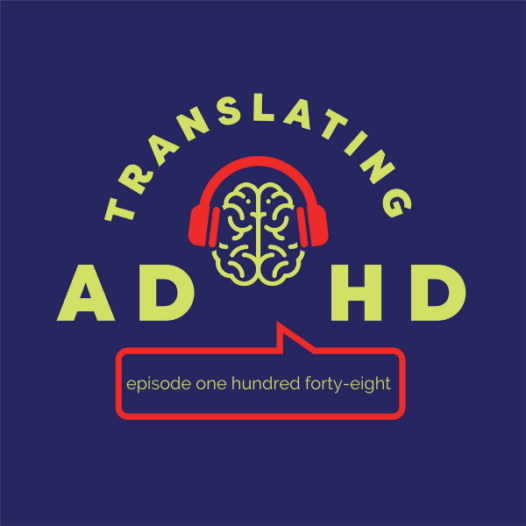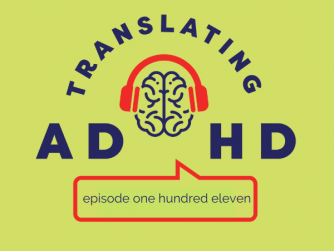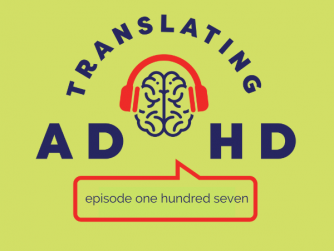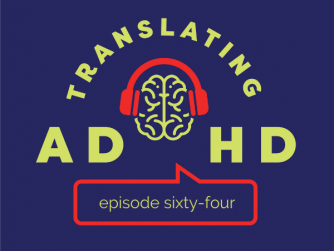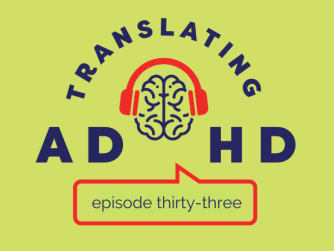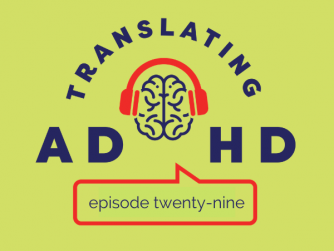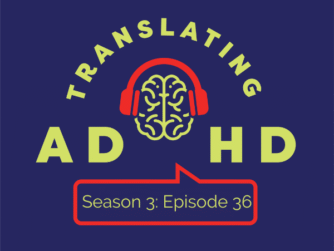This week we turn our attention to the role of needs with respect to our own unique lived experience. Needs often are overlooked when it comes to ADHD primarily because of the very nature of needs. They operate often quietly in the background, and when they do make their presence known they show up as stressors. Needs are those things that make functioning sustainable. When needs go unattended they turn into stressors.
Those of us with ADHD use stressors to get things done, and we often walk a fine line between stimulation and stress. Cam brings his Hierarchy of ADHD Needs model to illustrate what they are and how needs depend on one’s own unique lived experience. Based on Maslow’s work, the hosts discuss how the model is more of a prompt than something to be taken literally.
Ash and Cam use multiple examples to discuss how needs intertwine with values and how recognizing and honoring needs is at the root of living authentically. Cam shares a client story of how the client can only generate hope when he addresses three specific needs. And with ADHD, the dilemma is remembering our own recipe of specific needs.
Episode links + resources:
Cam Gott’s Hierarchy of ADHD Needs
The model and specific ADHD distinctions:
Physiological ADHD Needs – brain awareness leads to better brain management
Safety ADHD Needs – identifying relief from daily stressors
Belongingness and Love ADHD Needs – positive environments that honor your authentic self
Esteem ADHD Needs – the need for self compassion and creative action and completion
Self-Actualization ADHD Needs – creative expression and connecting to something bigger than yourself.
For more of the Translating ADHD podcast:
- Episode Transcripts: visit TranslatingADHD.com and click on the episode
- Follow us on Twitter: @TranslatingADHD
- Visit the Website: TranslatingADHD.com
Episode Transcript:
[00:00:00] Ash: Hi, I’m Ash. [00:00:01] Cam: And I’m Cam. [00:00:01] Ash: and this is Translating ADHD. A couple of group coaching announcements. Agency is open for registration. That begins Tuesday, January 17th and meets at 8:30 PM on Tuesdays. And we have a new class that is just with me, that is Purpose. It begins Monday, January 30th and also meets at 8:30 PM Eastern. And this class is really about discovering your who. So for those of you looking to do some big agenda work to find some anchors to, what are you moving toward? This is a great class for that.So, Cam, you wanna tell our listeners what we’re talking about this week?
[00:00:44] Cam: So Ash, yes, I was reflecting on the last couple episodes we had the interview format with Sudhita and Inger Shaye and John, and then our discussion week about your coming out as a trans man. And I also had an interview that I was preparing for, and somebody wanted to talk to me about this thing that I did several years ago – what I call the ADHD hierarchy of needs, and it’s based on Maslow stuff.So I was getting ready for that. I was thinking about this episode of how to follow up around your lived experience matters or your context matters, and it really got me thinking about the role of needs. I just was thinking about our last four guests because you were a guest last week in a way, right? Digging into your whole experience of transitioning to a man. And what it had me thinking about was how our recent four guests really have a sense of needs. And needs that they need to honor in order to do what they’re doing.
And so how ADHD comes into play here is that, first of all, needs are these things that are operating in the background. We talk about this all the time. We bring them forth in our group coaching because our clients or our students are often not thinking about needs, right? They’re not the big signal. They’re in the background. the form that we use, that you use, and we use it from coach approach, is needs make functioning sustainable, right? Those things in the background that help us get things done, and if we don’t address needs, they will often turn into a stressor.
[00:02:33] Ash: I think it’s important to say that needs is often where we start with any coaching client, and it’s not where a coaching client expects to begin. A coaching client comes to us with what’s not working, how they need to be showing up differently, what they need to be attending to that they’re not currently attending to, but oftentimes, They’re drawing from an empty, Well, this is the stuff of put your own oxygen mask on first, which sounds cliche, but with ADHD is so important and so often missed because from that one down perspective, we tell a story that we can attend to our own needs after we’re caught up after. We’re doing what we ought to be doing. [00:03:22] Cam: So often we respond, and enthusiastically, to others’ needs, right? Others’ needs can present as a big signal. So we will be in this mode of responding and reacting to others’ needs our own needs go unaddressed. So this hierarchy is, something that I develop. from Maslow’s Old Hierarchy and we’ll put a link to it, in the program notes, a disclaimer is has been challenged for years and years, right.It is an old model that has been challenged and. Updated and there are more recent and accurate models for addressing personal needs. I use it really as a reference point. it as a reference point and to not interpret it literally. So literal interpretation of Maslow’s hierarchy of needs is you can’t really address a higher need until a lower need is fulfill.
So for listeners to give you that background of Maslow’s and then we’ll talk about my interpretation of that. So for adhd, right? Just to give you that framework. So there’s that. The physiological needs of food and shelter is, the first one. top of that is safety and security. Above that is love and belongingness and connect. Above that is esteem. And then the final one, the fifth one, self actualization. And there might even be an additional level that’s been inserted over the years. So for us, we often will focus on the higher levels because more it’s more exciting. And remember, listeners, we are wired for interest, we are wired for that big signal. Meanwhile, these lower level needs will often kind of rest in the background and will bite us when we don’t address them. So just for a second to think about that security and safety one, the way we look at it is developing a relief from daily stress.
This is the, electricity bill. is the overdraft from your bank. These are these things that if you don’t have a routine or system or practice in place, will become more of a stressor, and then we have to just be battling these things all the time. The problem with ADHD is, we have a love hate relationship with stressors. We will walk this tightrope between stimulation and stress, sort of use stress to get things done. That’s that whole response cycle or the arc pony that we talk about in episode for Asher. So it’s this sort of, we love to do this stuff, but it also can be a dangerous game. But I was just, again, thinking about Our focus right now in the podcast around your lived experience and just witnessing our conversation last week and the conversations before, and I’ve been thinking about a client around starting to identify our unique needs for our unique lived experience.
[00:06:43] Ash: First of all, I have to tell on myself a little bit here. So the day that we’re recording this episode is the day that I came out publicly – the day that the episode where I talk about my transgender experience, last week’s episode came out. I also put out a video. I put together a new website, and boy was that ever an ADHD experience, the likes of which I haven’t had in years in terms of how I let all of that come down to the wire and scrambled through all of it, and also had a number of things that I wasn’t and haven’t been attending to. This is also at the heart of our self care class. You talk about individual needs, and in our self care class we talk about the distinction between taking care of yourself, so doing things like brushing your teeth, getting your exercise, eating well, and practicing self care, Doing the things that uniquely for you are going to help put something back in the tank. [00:07:54] Cam: Yeah, and that’s a really important distinction that we make, and it’s sort of like you can see the collective light bulbs go off in the class, just recognizing that distinction, because often people think about self-care or these lower level needs as, Oh, hydrate. Floss, get sleep. And those are important.But there’s also this other element of what fills you up. So Asher and I have been talking before, just thinking about all the different episodes we can talk about here. I can’t tell you Asher, how many conversations I’ve had in the last three weeks with professional women who are my clients, who are so enthusiastic about their content, their craft, they are amazing at, and yet they feel they cannot share that in a profess. Environment and so just there that need to be fully engaged and yet having to keep a lid on that number one is not cool as a woman to show enthusiasm or get excitable. Number two, emotional regulation aspect of that. So there’s a whole nother episode right there, just the need, this is where they get refueled and filled up and yet can’t for many different reasons.
[00:09:22] Ash: Looking at your hierarchy of needs, which we will put in the show notes, that to me, falls under this belongingness and love, support, and acceptance of who you are. And while I am not a woman, I lived as one for 38 years, and I can tell you that is absolutely true. Enthusiasm is treated differently when you’re a woman.Sudhita touched on this when we talked to her. And she had a double whammy because of that model minority expectation that people put on her. And Cam, it’s so interesting this is just now coming up for me, but I’m gonna throw it out there anyway, Looking at your hierarchy of ADHD needs, the flip side of this is places where we can all mask. We can all, rather than meeting our needs, we can try to bend and distort ourselves to fit whatever picture we think we are supposed to fit.
[00:10:26] Cam: And so one of the things that happened last week when I was listening to you talk about your transition and reflecting on that, you said something, you said, I could have stayed as a woman, it is possible and the language is not exactly there, but just had me thinking about so many people having and feeling like they have to live inauthentically.And in that moment, I realized one of your big needs is to live an authentic life. And that’s what happened. This fall in exploring and discovering and this out and putting men’s clothes on for the first time and going to get that haircut with these tests around stepping closer to your authentic self. So in a way, all of us with ADHD are so familiar with this masking of trying to pass as neurotypical. And so we also brought that in with, again, in a way masking as a woman for you
[00:11:31] Ash: Cam, funnily enough, this is not the first time on this show that our listeners have been right there with me as I step more into who I am. Episodes we did in July of 2020, stepping into who you are and honoring who you are.I was going through a divorce and my life was going through a different sort of transition at that time, and it was just as this is brand new. That was really brand new because it was happening right then. And so listeners, that’s a great set of episodes to go back and listen to. And you’re right, authenticity is at the top of my needs. And when I’m out of authenticity, I’m out of integrity.
[00:12:17] Cam: And it brings us to this whole idea of, how do you fold values in here authentically. When is it a need and when is it a value? And I think, listeners, we are popping with episodes coming up. [00:12:29] Ash: So I will toss in how I distinguish values and needs for my clients because I start every new client with the values and needs exercise as a way to get to know them and as a way for them to get to know themselves a little bit better as a way to anchor to the who of the client and what matters needs are about who you are.In this world values are about what you value in yourself and others. And so it’s interesting, we’ve just called authenticity a need, but it’s actually a value for me because I value authenticity in myself and others. Authenticity is something that matters to me when I choose who I surround myself with, who I’m close with, who’s part of my chosen family.
[00:13:22] Cam: You know, there’s so much talk about trauma living with ADHD, and I really think that my clients, they come with this value of integrity, and yet they live their lives out of integrity. Just from the literal definition, it’s, they cannot do what they say they’re going to do, and they don’t know. And then they think it’s some kind of moral defect.There’s so much here, Asher. So I want to pivot to my client because I’ve been thinking a lot about him around again, your lived experience, your context matters, and identify needs for you. And this goes back to this whole prescriptive thing that happens in add land. People are looking for generic. General tips and strategies to address their ADHD. Your ADHD does not act alone. It is in there with everything else that’s going on, whether it’s chronic pain, whether it’s an environment, it is there, and I want to bring this client in to articulate this. So this client is a long time client. And I’m helping them with some important type tasks at work that are not urgent. We talk about is in a role where he is an IT provider. And so he gets to kind of wear that fireman’s hat to get up and fix the problem, keep his clients happy, and that works. He’s really good at that and yet doing those things to build the business, to transition the business.
The other type activities where it’s important but not urgent, have been a little bit more of a challenge. on top of his adhd, he has two conditions, One is a chronic. If he is not actively managing this chronic pain, it can be absolutely debilitating. Secondly, he has an ongoing health issue is advanced, and has advanced practitioners in both of these camps around pain and managing this other health issue.
So he’s got a lot going. I can tell when he comes to a call, I can tell he’s not addressing some needs right away, and when I reflect back to him, he can tell too. But getting to these, sort of, three areas that he’s identified, if he addresses them, it’s a game changer.
And if he isn’t addressing them, it creates a massive to that is possible that week, that day, that minute. So his situation. If he is not getting his rest, If he overextends himself in any way, physic. Friends come into town and he goes more than four hours walking around town. It’s like down to the hour. If he does more than four hours, it throws his back into spasms. And then finally, if doesn’t have a plan of approach for these two conditions, So he is working with advanced practitioners in both areas people saying, you know, I don’t know. I’m not sure. I don’t have a plan for you.
But if he does have a plan he is watching his not overextending and he’s getting rest, one thing he has is hope. And you can hear it in his voice when he comes in. He’s like, Things are tough, but I’m doing okay versus if he is in the lowest of low places. What I do is I go to those three areas first. How’s the outlook? Do we have a roadmap to address these two areas? How’s your. And again, it’s often he can handle one of those, but if he’s down in two of those areas, it’s likely then his mindset or attitude or sense of hope tips over into hopelessness. then it’s all bets off. And it’s sort of like What’s the point? into a negative spiral. Inner critic jumps on takes him down into a dark rabbit.
[00:17:35] Ash: I love this client example because it speaks to the base of your ADHD needs pyramid, these physiological needs that are important for all of us, but for this client and his particular context are critical. In a way that most of us can’t imagine, that limitation of I can only be physically active for this long and pushing myself any longer is going to cause a crash and not just a physical crash, but an emotional crash that rides along with it.And so for this client, it’s about knowing those needs. And honoring those limitations, learning to work within the limitations that he has physiologically.
[00:18:31] Cam: Right, and the problem or the dilemma with ADHD. This is the third barrier of ADHD. So we have the third barrier, which is the barrier to learning. We learn this stuff, learn it over and over and over again, and yet life interrupts and we forget. We misplace this important data, this information, and it comes back. And we remember, Oh, right, Yes. Okay. This is the thing about needs. They tend to be pretty. They will come back and tap you on the shoulder and like, Hey you know, you can try to rationalize and extend and do deal making, but I’m here and this is how it consistently shows up for you. And that’s what happens, is this coming of reorienting or reentering to, Okay. Right. These are consistent and I have to, as you said, gotta honor this. He’s also realizing this other important thing. He’s finding the value in being hopeful that he can be down in one of those, if he still has hope, Then it is a game changer for him. And so now he’s seeing, Ah, there’s a benefit to honoring and addressing and practicing these needs. Because what I get from this is a sense of hope and from hope is momentum and determination those higher needs esteem and self actual. [00:19:58] Ash: Listeners, I want you to hear the coaching work or the awareness work that this client has done here, because what does this client need? He needs to be aware of his limitations and he needs to plan for those limitations. And what does ADHD make Really challenging, Being aware and planning for. So Cam said something really important here and that is that this client is connecting to a new positive outcome. That when he is aware of and when he plans for he retains hope.We talk a lot with our clients, and I’m not sure how much we’ve talked about it on the show, but we talk a lot with our clients about having new experiences. That right there is the crux of ADHD coaching. It’s so important when we design actions with our clients around whatever dilemma they’re bringing to coaching. The goal is to have a new experience, and that new experience becomes its own powerful source of motivation, of desire to keep doing the work, to keep having this new experience. I talked about this a little bit when we talked about Let it be easy, Let it be easy, is a way that I remember the positive experience on the other side of letting it be easy.
That silly thing of let it be easy by doing the dishes every day. Let it be easy is just a mantra that reminds me why I wanna let it be easy, what that positive outcome is. So it’s not the mantra that’s magic, it’s the connection to. That positive, different experience that I know I will have if I continue to keep up the practice of letting the easy things stay easy.
[00:21:57] Cam: And that’s good cause and effect work, which is what this podcast is all about, is looking at causation and a different effect. So listeners, a lot here, and we’re gonna stay with this model for a couple weeks here. Here’s a couple thoughts. Again, you might be over there thinking, yeah, it’s too linear, it’s too hierarchical, Cam, don’t let it be.Just let it be a prompt to pay attention to these five areas. Trying to kind of, again, clamor up to the higher levels of a esteem in self-actualization, start to look at the structural supports below that around. And there’s also some specific terminology that distinguishes this from Maslow’s very terminology, and I’m just gonna bring those forth right here, right now as we finish up.
So one is ADHD management. Can’t have ADHD management or effective ADHD management without This is our whole idea around presence and curiosity and being present and curious to your own lived experience. Your experience is not mine. It’s not Asher’s, it’s not Sudhita’s, not Inger Shaye’s, it’s not John’s. Yours is yours to start to look at it as your own and to claim it, right. Asher back to understand, own, translate that owning aspect to. To start to look at the safety needs. Can we put something in place to limit daily stressors with belongingness and love as you extend to others and seek connection to first connect to yourself, to accept you for who you are to live more authentically given your environment.
Right. Again, back to safety. What is safe. Esteem starts with We can be so hard on ourselves for not doing what we’re supposed to do today, So self-compassion and building out practices to have that different experience, to get something done, to build supports. I’ve said so many times, I collaborate to get things done.
That’s how I’ve gotten to this, have to some esteem is to get some completions, those completions were shared publicly and were supported. And finally, creative expression. You know, when our self care classes, Asher, just this desire for creative expression and somehow I don’t have the permission to do.
And so giving yourself permission for that and connecting to something bigger than yourself. We are connected to something bigger than ourselves. You know what it is? It’s you listeners, because we know we’re making a difference. That empowers us, That gives us motivation, it provides attention, It makes us less distract. There is ADHD management in all of what we’re saying here,
[00:25:05] Ash: Well said, Cam, and I think that’s a great place for us to wrap today’s episode. So listeners, if you like what we’re doing here on the show, the biggest way you can help us out is to leave a review wherever you listen. We cannot overstate how important reviews are to the show. Been a while since the last one, so we’d really appreciate it if you have the ADHD bandwidth. Take a moment, leave us a review.A couple of other ways you can help us out. Don’t keep us a secret, and we know many of you are doing this already, but share us with the other neurodivergents in your life. And finally, you can financially support the show and gain access to our Discord server where our listeners are doing their own understand, own and translate work by visiting the website, translatingadhd.com and clicking on the Patreon link. Five bucks a month gets you access to the Discord server and helps Cam and I with all of the costs of running this show. So until next week, I’m Ash.
[00:26:08] Cam: I’m Cam. [00:26:09] Ash: And this was the Translating ADHD podcast. Thanks for listening.
